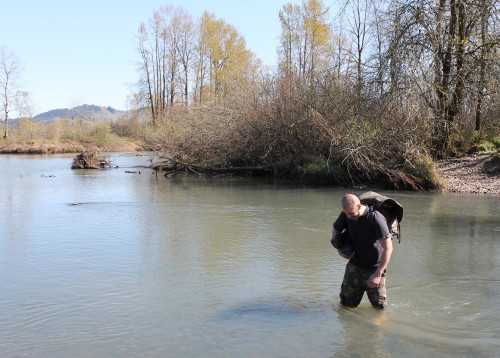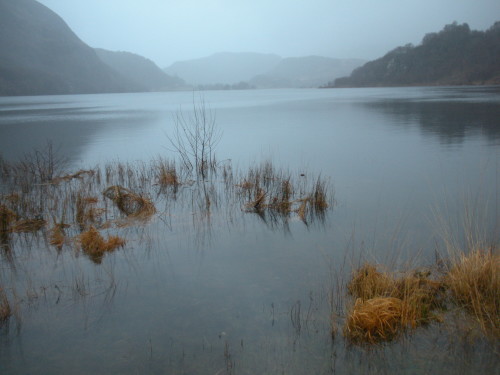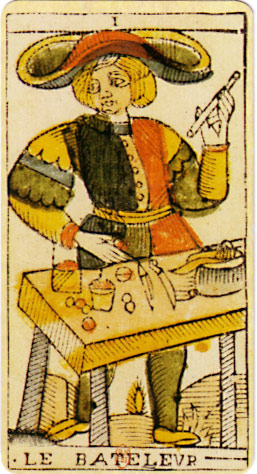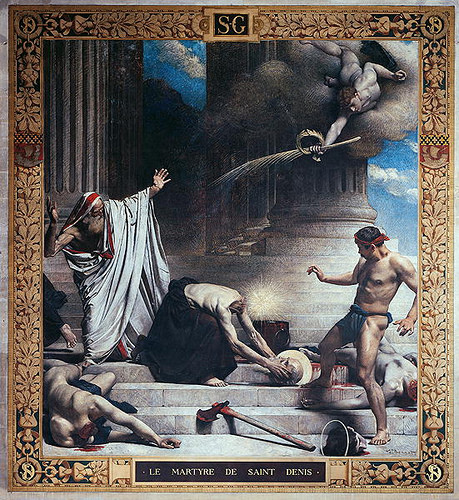[This is a literary version of a presentation being presented at the Many Gods West conference on August 1st. Columnist Rhyd Wildermuth now has a Patreon support page.]
“I think I need to tell you something.”
I’m trying not to scowl at the man who’s interrupting me again. It’s a Lugnasadh, two years ago, a warm sun pouring through the willow branches onto my ruined circle.
I’m still grumpy with him. Today’s the first time I braved a public druid ritual to honor the wheel of the year, sitting in a park along Lake Washington in a small grove not far from the ruins of a highway on-ramp. I’m in an area not often frequented by most people except a certain sort of people, but I thought I was far enough away from their recreation to remain unbothered.

Image public domain
Besides I look dour, and I’m sitting with lit incense surrounded by feathers and stones, a grizzled man with a shaved head, doing bizarre druid-things in an obscure corner of a massive park. I figured no-one would approach me.
But this guy? He walked right through my circle, clutching a book, oblivious to everything except my sudden barking, “Hey!”
I’d yelled at him. I’m not really proud of that. He was elderly, perhaps in his early 60’s. And I rued my reaction even more when he returned.
In my defense, though, I was sitting not very far from a gay cruising area where men—often married and officially ‘straight’–would have quick, detached sex with strangers in bushes. I love the area itself—haunted, post-apocalyptic, a place where humanity’s failed attempts to conquer nature still linger in ruins.
I’d chosen the place because it was far enough away from ‘mundane’ folks that I’d be ignored, relying on its reputation as a sexual playground to drive middle-class white families away. But this meant I risked being interrupted by men suspecting I was on-display in their outdoor bazaar, and I’d occasionally notice some awkward man or other, still wearing his tie and wedding ring, tentatively approaching me before noting the lit candles and incense and steering back toward easier prey.
So when this man walked, utterly oblivious, through my circle? You can excuse my moment of rage. I figured he was trying to hit on me, ignoring all the signs I’d put out to ward them off.
I guess I should tell you something else, though. I’d just asked the gods for a guide for the mystery they were showing me. A dark bard in the underworld had shown me a vision of massive destruction, and I was a bit confused. What did any of that mean? I was a bit wrecked, really — I knew there was something I needed to understand, but I couldn’t, and I’m sitting at the gate of Lugnasadh begging for a guide and this f**ker just walks right through my circle.
Maybe you’re laughing. I am, now.

(CC BY-SA 3.0) Union Bay, by Joe Mabel
“I think I need to tell you something,” he said, returning to the edge of my re-cast circle after a few minutes of sitting by the water, reading. He was staring at me, or actually at the pile of crow feathers in front of me.”
I relaxed my scowl. “It’s okay, really,” I answered. My concentration was broken; this ritual wasn’t happening anyway. And then, not really knowing why, I invited him over to where I was sitting and handed him a crow feather.
I didn’t expect his awe when I did this. I felt I should give him something. He was eyeing them, and I had plenty. They fall from the sky, after all, but he then started tearing up.
“Feathers — she gives me feathers. I…”
I was getting confused, but fiercely intrigued.
When he’d gathered his thoughts, he continued. “I just need to tell someone this, and now because you gave me a feather I think I needed to tell you. My wife just told me she’s taking me back to an island where we first met 25 years ago. Can you believe it? I’ve been with her 25 years, and I didn’t know I could ever be in love like this.”
I wasn’t in love; I hadn’t been for awhile, actually, and was a bit bitter about this. Still, it was hard not to tremble in deep joy with him as he told me about her, staring at the feather in his hand.
And I don’t know why I tell him this, and I don’t know why he’s telling me any of this, but it’s all happening. And, anyway, I’d asked for a guide. “Leave that feather on the island,” I suggested.
He shook his head knowingly. “I will! Thank you. Thanks for hearing my story, and again, sorry I interrupted you.”
“I’m not sure you did,” I said to myself, watching him walk away, dazed, happy.
What is Water?
I worship Brân, the Welsh Giant King, the Blessed Raven. With all the grand works both Odin and The Morrígan are up to, I sometimes like to remind people that there’s another Raven god, but he’s onto his own stuff, and it’s mostly all revolution anyway.
I met Brân on an island, and in some mountains, and one time just walking down the street. I had a vision of him standing thousands of feet above a valley wearing a rippling black cloak that later proved to be millions of ravens consuming his flesh. Then, a few months later, I saw that very valley in the same storm-lit skies from the side of a mountain in France with my physical eyes.
One time, I was with a dear friend exploring an island in the middle of the Willamette river. I remember thinking of Brân the entire time that we were there and laughing when our mutual companion, noting how much difficulty we were having fording the cold river back to the shore, said “you should lay down in the water and let her cross over you.”

Fording the Willamette (Photo Cedit: Alley Valkyrie)
I could go on, filling pages and perhaps books with such meaningful occurrences, what Jung called ‘synchronicity.’ But more than likely, you get the point, because such things have probably happened for you, or maybe, reading this, are about to, because gods and meaning are both contagious (Sorry about that—I may have just given you a flu from the Otherworld.)
Importantly, though, these events which weave a tapestry of meaning for me run generally counter to the main thrust of meaning in Capitalist society.
In Capitalist society, Gods don’t exist; just like homeless people don’t really exist; just like stars are really just large balls of flaming gas. But to this I must answer, the stars are balls of flaming gas if animals are mere food and trees are mere fuel, humans mere workers and puddles mere bits of water.
That is, what something really is does not begin to describe what something means. Looking for the material being-ness of a thing, rather than its tapestry of meaning, is to destroy it. It is like disassembling a flower to know what a flower really-is, or like pulling out the veins, tendons, bones, and organs of your lover and arraying them before yourself on a table so you can learn why you love him.
That is, dissect a thing to know it and you’ve killed it, or at least made it no longer meaningful.
Take water. Water is made of the bonding of several atoms, atoms are tiny particles held together through poorly-understood adherence principles which can be split and reconfigured. That definitely doesn’t tell us what what water actually is, let alone what water means.
Water can be in several forms, gas, liquid, solid. It dissolves things, makes other things expand. It freezes at 0 degrees Celsius (which is a measurement of heat—which is agitated particles–calibrated to that transition point of liquid water into ice), and it boils at 100 degrees Celsius.
But what’s a glacier, then? What’s an ice-cube? What’s snow? And what’s a lake, and how is it different from a river, and different from rain, or from a tropical waterfall as against the cold torrent of a northern cascade? What’s a glass of water, or what’s a bath, or a shower, what’s the difference between steam rising from a tea-kettle or from a pot of soup or escaping from the pressure-release valve of a steam engine? What’s the mist that settles on your skin as your children play in sprinklers on a summer day, and what’s the mist that sprays your face on a cold day overlooking crashing waves? What’s the snow falling on your tongue as you laugh with a lover, what’s the snow falling on bleak streets as you wonder if you’re lover’s car is safe on the road?
The answer to “what is water?” cannot be answered without also answering “what does water mean?”
And what water means is rarely the same to each person. The same lake where two trembling lovers declare their love to each other can be the lake where a mother goes to mourn her drowned child. What does that lake mean, then? When we ask each other the meaning of that lake, how do we determine what it ‘really means’ past all the varied opinions and experiences and feelings of that lake?
We have two problems here. To know a thing enough to refer to it, we must have some idea of existence outside the realm of meaning, and some way to abstract (or extract) its ‘essence’ to speak about it. But by doing so, by speaking of a thing outside its meaning, we do great damage to it.
On the other hand, to know the full meaning of a thing would take more than an eternity.
Who am I, really? I’m a story, not just a human—I cannot be fully known by being dissected, and every attempt to do so results in some sort of brutality against my body or meaning. Any title, any name conjured to define (de-fine, to make finite, to give ends and boundaries to) me limits my existence, closes off my meaning. I am Rhyd; I’m a gay man; I’m 38; I’m a writer; I’m a poet. I’m an anarchist; I’m a lover; I’m a brother; I’m a social worker. I’m a bard and I’m a gods-worshipper. I would need an entire lifetime to define who I am with words, and this says nothing for all the meaning I have to others.

Llyn Dinas, Wales (photo by the author)
What’s Meaning Mean?
But what, then, is meaning? We create meaning. Meaning is a social-act, a kind of intercourse between us and the world, and us and each other.
Let’s look at Truth, briefly. What is the meaning of Truth? Truth is what something really-means or really-is, beyond all appearances or beyond all the socially-woven threads of meaning.
But what’s a tapestry, really, without all the threads which weave it? It’s no longer a tapestry.
What are you, really, when we get to your core existence? A dead and dis-membered pile of bloody muscle and gore.
If we try to get to the Truth of a thing by reducing it, we get inert material. But if we try to get to the full truth of the thing the other direction, we face an even more impossible task, because the Truth of who I am isn’t something I alone can determine. In fact, if I am the sole arbiter of the Truth of myself, that makes everything a lover has ever thought of me, or what an enemy has ever feared of me, an utter lie.
So, Truth and Meaning both exist on the same field and are mostly interchangeable, except that Truth has an opposite (falsehood), while Meaning has no opposite except its absence—Meaninglessness.
And if something is Meaningless, it means it’s something we reject, we throw out, or ignore. Meaningless people do not matter to us, meaningless events become excluded from our narratives, and the very feeling of meaninglessness is what we call despair.
What does Meaning mean? What’s the meaning of meaning?
These aren’t just the malicious mischievous questions of a mad bard, but the very crux of our problem. Meaning can’t be reduced, it only expands. Meaning has no cognate, and the only other word in the English language that comes close to functioning as its synonym is not Truth, but Love.
When I love someone, they have meaning for me. They are meaningful to me, I derive meaning from them, we mean something to each other. When I do not love someone, they hold no meaning for me; they are meaningless to me, or they mean no-thing to me.
When something means something else, or when someone means some thing, we are stating that there’s a correspondence between one thing and another thing. In translation, we might ask what amour or Liebe ‘means’ in English, which is to say ‘what word in my language corresponds to that word in yours?”
As I stated a little bit ago, “meaning” is a relational word, and there’s no co-incidence that something “meaningful” to us is often said to give us ‘reason to live.’
From the ancient philosophers, alchemists, astrologers, and magicians we have the search for the key to correspondence between one thing and another. From the modern science, we have the search for the reason for the relationship, the reckoning of something’s being and existence and its correspondence to natural laws.
That is, they both search for the same key—meaning. Not Truth as we think of it, but Meaning. What does it mean when an organism behaves in a certain way to certain stimulae, and why does it do that? What does it mean when planets conjunct or I cast a circle and something appears, and why does it do that?
Meaning is the very key we seek, the relationship between one thing and another, the foundational drive and ‘reasons’ things are what they are, and the very stuff which makes our lives livable—that is, full of meaning.
Meaning is what we actually mean when we speak of magic, and the very core of human existence. Trees don’t appear to seek meaning, nor do stars or crows. And while some animists might object to the inherent anthropocentricism of such a statement, I’ll say it anyway—humans are the only seekers of meaning we’ve yet encountered, and it’s perhaps the one identifiable social contract we have both with each other and the world.
We create meaning. That’s our magic, not just that of a poet or artist, but also that of a lover or a child or a friend, the sorcery both of warrior and bard, king and slave. We are meaning makers, and meaning is the thread which weaves us together.
The Jetztzeit
Walter Benjamin, a Marxist philosopher and theorist, suggested that before any revolution there’s a revolutionary-moment, a time-out-of-time—the Jetztzeit (now-time). Just before that moment, all the events which would lead people to desire a revolution had occurred and seemed to rush into a single moment. The time after the Jetztzeit is an entirely new thing, all the moments stretching out from that radical still-point. If you’ve seen Doctor Who, you might recognize this idea. In the series, there are certain immutable moments in time that cannot be changed by a time-traveler because all other moments spring from it.
Two cards from Tarot, The Fool and The World, explain this quite well. In many depictions, The Fool is about to step off into the great unknown with only what is carried in a small bag. And in many depictions, the World is a moment of completion, an eternal moment of unity, the culmination or ending of a cycle just before a new one begins. After the World? The Fool, and after the Fool?
The Magician.
 Benjamin’s idea was that there are certain moments in which everything can change, in which the course of history (that, of course, a narrative of meaning) can be altered, shattered, and a wholly new-thing can arise from the actions taken during that moment, the now time or Jetztzeit.
Benjamin’s idea was that there are certain moments in which everything can change, in which the course of history (that, of course, a narrative of meaning) can be altered, shattered, and a wholly new-thing can arise from the actions taken during that moment, the now time or Jetztzeit.
But how do you know you’re in the Jetztzeit, or the revolutionary moment? It takes a certain awareness within that moment to recognize the meaning contained within that moment, the ‘revolutionary potential.’ It’s the moment of the magician, the revolutionary, the poet, who acts not according to all the meaning that has existed before, but to create a new meaning in that now-time.
A man stumbles through an invisible ritual circle a moment after another man has asked for a guide. This is a Jetztzeit, a moment both meaningless yet pregnant with meaning, both the Fool and the World together. My first reaction was one of anger and frustration; I had not yet recognised the thread of meaning attached to his appearance and my request. The Jetztzeit almost disappeared, were it not for his return and my calming.
And in that moment when I recognize not what it means that the man had walked through but what it could mean, I performed a kind of magic, moving from The Fool to the Magician, finding a correspondence and a reckoning and a relationship between two otherwise disparate amounts.
And I use the word recognize here, not ‘understood.’ Because what was really The Truth of the man interrupting my ritual? There was no Truth, only potential meaning, and it was for he and I both to understand. I needed to recognize his meaning, not just what he might mean to me, just as he recognized my meaning, not just what I might mean to him. Meaning is never a solitary act.
But sometimes others try to create our meaning for us, and to take our meaning from us.
The Poet, the Priest, the Politician
On June 17, a man named Dylan Roof sat in a prayer service of the Emmanuel African Methodist Episcopal Church, and as the people gathered, praying, he shot ten of them before escaping. Nine died.
Coming after so much recent, extreme violence against Black people in the United States, it was not hard to piece this meaningless event into the narrative of white-violence against the descendants of former slaves, particularly because the church he chose, and the victims whom he shot, were Black.
But we should remember this—the event is only itself, standing outside of meaning. It is a meaningless event until we thread meaning through it. That’s not to question that narrative at all—in fact, there’s an insidious war against Blackfolk in this country that has flared to new levels of horrific violence and daring.
I bring up the event as outside of meaning, however, because of one of the first narrations of the event to be broadcast by FOX news. In that segment, a conservative Black pastor is questioned regarding the event, and he states that, rather than being an attack against Blackfolk, the shooting was a clear attack on Christianity. From his viewpoint, the secular and anti-Christian sentiments in America have become so strong that people were shooting Christians in their own churches, and it was time for Christians to arm themselves to protect their religious beliefs against the infidels.
There’s a lot to be said about this interview, particularly regarding the source, as FOX news is hardly known for speaking on behalf of the oppressed, unless by ‘oppressed’ we mean white straight Christian males.
Return to the question of meaning and the Jetztzeit. There are certain events which stand outside the apparent ‘normal’ course of history, or rather outside our narratives of meaning. These events present threats to our way of understanding the world.
For a white, conservative pro-Capitalist Christian heterosexual male, whose comfort and power in society rests upon being told he is doing nothing wrong and the world is his (which is what we mostly mean by the word ‘privilege,’) a mass shooting of Blackfolk by a young white straight guy in a Christian church presents an almost violent threat to the meaning of his life and the society in which he lives.
To most of us, it’s unquestionable that this shooting was part of the long history of violence against Blacks in America, even before the murderer’s racist motives were revealed. But for the narrative of a ‘post-racial’ secular Capitalist American society, the massacre became a sort of tear in the tapestry-of-meaning that needed to be repaired—and quickly.
A much larger event from 14 years ago had a similar effect on the narratives of power. When two planes crashed into the financial center of New York City, it took days and weeks for that tear to be repaired.
Naomi Klein, in her book The Shock Doctrine, did significant work tying together the psychological trauma that individuals and societies suffer and the political usefulness of those traumas. Natural disasters like the flooding of New Orleans or manufactured disasters such as the collapse of economies, such as what Greece is enduring now, are often sites of extreme political and economic violence, and seen by many of the powerful as a chance to re-assert a certain authority and political ideology upon people experiencing psychological, emotional, and physical ‘traumatic shock.’
What she’s referring to is similar to Waltar Benjamin’s Jetztzeit, as well. Disaster defies meaning, regardless of how many televangelists want to blame every hurricane and tornado on gay marriage. Breakdowns or gaps in the normal functioning of society create similar openings in our narratives of meaning.
In those moments, what I call ‘traumatic gaps,’ there is typically some struggle to attach meaning to an event, either to pull the thing back into the main narrative of the powerful (as in the case of 9/11, or the attempt to definite the Charleston shooting as an attack on Christianity), or by those who sense within gap the way out of one world into another.
Many Gods, No Masters
(Stealing our Meaning back)
What does it mean that gods are appearing to us? Really, what do they mean at all?
I’m afraid to say, and also delighted to say, it means nothing at all, or not yet.
Obviously (but I’ll re-iterate it anyway), I’m not saying gods don’t exist, otherwise attempting to rebuild the cult of Brân the Raven-King is a rather silly thing to do. Nor am I saying gods are meaningless. If anything, they are a fount of meaning itself, the patterns upon which we weave the rest of our threads of meaning.
Gods aren’t an ideology or a narrative. Rather, like us, they are meaning-makers. They create meaning with us, just as we create meaning with them.
But as you know, we’re not really supposed to believe that gods exist. Often, either we’re thought crazy, or assured that our experience of a goddess is actually part of some bigger Goddess, and this is a way others attempt to steal our ability to create meaning or claim the meaning of a thing.
But why try to claim the meaning of something? The answer is precisely also why I’m an Anarchist–authority and power.
We talk often of the Catholic Church and its destruction of ancient religions, but rarely do we look directly at the processes they used to do so. Beyond the sword of conquest, the pyres of the heretics, and the axes used to cut down sacred trees, there was a much more systematic theft of meaning enacted by Christians hoping to gain power over people–the Saints.

The Martyrdom of Saint Denis, by Leon Bonnat
Take St. Denis, the patron saint of France.
“St. Denis” was beheaded along with two companions when he climbed a druid-hill to evangelize them. They sacrificed him, but when his head fell off, he caught it and walked with it in his hands down the hill 6 miles to a place where he finally dropped dead. From his neck sprung vines and wine, from his head sprung a fountain.
Denis (Dennis) is the Gaulish-Latinate derivative of Dionysos, and St. Denis’ martyred companion was Eleutherius. Diónysos Eleuthereús, you may know, is “Dionysos the Liberator.” And the place where he was martyred? It became named “Le mont des Martres” or Montmartre, the red-light district where sex and wine flow freely, popularized for Americans by the films Moulin Rouge and Amelie.
That’s right. The sex-and-wine district of Paris is an ancient Druid site.
It’s not hard to see why the Church might need to displace the worship of Dionysos (and the druids) in a city like Paris and claim him, embodied in a saint, as one of theirs. It helped secure their rule, especially since Dionysos The Liberator was worshiped by the underclasses and slaves.
Diónysos Eleuthereús “The Liberator” brings us back to Walter Benjamin’s Jetztzeit. An intervention or appearance of a god for us now is so unusual, so outside the apparent course of historical narrative, so ‘meaningless,’ that there is a rush in the moment of our experience of them to create meaning around it, to ‘close off’ the traumatic gap they break open, to slam shut that gate.
As with the Jetztzeit, the moment of a god is a potential moment of liberation, even revolution, a tear in the tapestry of power around us, and a traumatic gap that others will seek quickly to close. Like the shooting in Charleston on the one hand, or the many acts of rebellion against Capitalism by Blackfolk on the other, the narratives of the powerful always try to close their own meaning, their own sorcery, around the Other world that we glimpse in those moments.
The meaning of our gods is currently not allowed to disrupt the main narrative of our society. It’s possible one day it might, but we should also be wary of who shapes that meaning. There’s already a golden bull on Wall Street, a sea-goddess on a Starbucks logo, plastic replicas of shrines to ancient gods in Disneyland and Las Vegas, and mass-produced films shaping the imagery and narratives of gods like Thor and Loki.
Perhaps our gods are not yet quite a threat to the powerful, but what this really means is that we still do not claim our meaning as our own. As long as we’re happy to enjoy the safety and protection of systems-of-meaning which devalue forests and Black bodies, our gods will be our own personal secret story.
But if one day we seize the moment of the poet and the revolutionary, embrace the Jetztzeit of the gods, and seek to reclaim our own meaning, than we should certainly expect resistance.
* * *
This column was made possible by the generous underwriting donation from Hecate Demeter, writer, ecofeminist, witch and Priestess of the Great Mother Earth.
The Wild Hunt is not responsible for links to external content.
To join a conversation on this post:
Visit our The Wild Hunt subreddit! Point your favorite browser to https://www.reddit.com/r/The_Wild_Hunt_News/, then click “JOIN”. Make sure to click the bell, too, to be notified of new articles posted to our subreddit.
Just to many topics to follow along ,ramblings
I have no doubt they connect up perfectly for him, probably do for many of his listeners. For me it was frustrating because just as I was starting to get my head around one part of this talk, he’d veer off into another one and I’d have to reorient my attention all over again. There were definitely topics toward the middle of that essay I wish he’d spent more time on, that could be essays all their own. (For very personal reasons I wish he’d spent more time developing the bit about 9/11. There was a time when searching for Meaning about the attack that nearly killed my husband (he was in the Pentagon but thankfully a bit away from the impact site, and as we all know, if they hadn’t hit the rebuilt section, it would have penetrated much further in) consumed many of my waking hours. There was a show on called “Rescue Me” that got a lot of “too soon” criticism (and was kind of terrible as a show) that I watched devotedly because it was the only thing I found willing to talk about 9/11 in a way that shook off the imposed narratives (either The Terrorists Hate Our Freedom or America Is Terrible And We Deserve It, depending on your political feelings) and tried finding other ones. It was like this beacon telling me that some of the thoughts I was having weren’t crazy, that other people were having them too, and I loved it fiercely for being daring enough to do that.)
You lost me at- “He was elderly, perhaps in his early 60’s.” (A nearly 59 year old here.) You don’t even get discounts before age 65.
He’s young. I remember thinking that 40 was middle aged.
I feel the need to respond as an Atheist, because I feel like I stand somewhere between Rhyd and the many “gods are just fairy tales” Atheists. I don’t believe in gods anymore; to which I mean, I don’t believe they’re personified beings with personal agency. But I don’t think they’re stories, I think they’re Stories.
The more… stuff… that accretes around a person, idea, place, god, etc., the more bewilderingly complex the layers of meaning. By “stuff”, I mean just… everything. All our thoughts, prayers, ideas, tales we tell, hopes, fears, dreams, lives, things we build, things we destroy, beliefs, invocations, curses, the whole lot of human existence. IMO gods are some of the most complex things in human history because so many things over such an enormous range of time have been layered into the names we know them by. I do think they’re inextricable from culture just as originally religion as a concept was inextricable from culture, and that’s why so much devoted to them is so darned shallow– if all you know of a god is a short passage in the “pantheon” section of a how-to book, it’s like looking at the top of an iceberg. When you call them, you’re calling on all of that history and all of that complexity, and even though I don’t believe they’re real beings, I still think they’re unbelievably powerful. So if I say they’re Stories, that’s not to demean them. It bothers me that most Atheists can’t see the difference between a story I made up ten minutes ago and a Story told across multiple cultures, woven into their most intimate moments, across centuries. (It also bothers me that so many Atheists seem to discard culture itself as meaningful, which is both incredibly colonialist and incredibly stupid.)
Has anyone considered that we each live in our own reality depending not only Variables such as the quality of our five senses, but our education level, what we believe, and what we can’t believe, our cultural background and IQ.
If you are talking with someone whose reality is similar to yours, then communication is quite simple. However if their reality is quite different, you and they will talk past each other and communication is impossible.
As for his rambling, to you perhaps it is rambling. If you consider each thing as a separate thing, then you will stay on one subject until you finish it. However if you see everything as connected the you naturally link together things that others think are not related.
I myself do this because I see patterns connecting all things together, and yes it drives some people quite nuts when I do it. But our realities are quite different and nothing that I will say will make a lot of sense to them, just as their reality will not make a lot of sense to me. Both realities are just as real to each person. I think what we claim to be objective reality is little more that mutually agreed upon subjective reality.
Some of Rhyd’s ideas I just have to take his word for because they are outside my personal reality and experience. He has very definite ideas about the gods, I am not certain what I think. He has personal experiences with them. As I don’t experience the gods the way he does, does that make his experiences unreal. Not at all, it only makes it outside of my personal experience. But his jumping from subject to subject makes perfect sense to a pattern seeing person such as myself.
One of my complaints about science is that it breaks things down and puts each thing into it own labeled box except that nothing is actually isolated like that. You can’t understand reality, if you only look at things that way. I have discovered that often scientists, in related sciences, do not talk and discuss things with those in other related sciences, much less with those in what they think are unrelated sciences.
So in a world of specialists, we are missing having enough generalists that see how it all functions together ad that is the base of any of the problems that we seem not able to solve that keep getting worse.
In religion, it might be the spiritual and material side of life they separate and yet both act on the other. If the material world were really not important, then we would not spend so much time living and learning our spiritual lessons in this material and mortal world in the first place. So here as well, we will need people who see the pattern that connects it all together.
Rhyd sees different parts than I do, so I do my best to follow his thinking as best I can, but I will still miss some of it due to my own limitations. But all of us are both students, and teachers, in this life at the same time to different people. We just have our own unique lessons to learn. That is what our life is about. Generalists will also need the specialists when they want to dig more deeply into any part of the pattern.
Seen the pictures sent back from Ceres and Pluto? Each of these triumphs of engineering represents a whole lot of scientific specialists talking to each other, intimately and at length.
I am very glad if they are, but I talk of my personal experience with geologists, volcanologists and experts of crystal growth and what scientists themselves have told me. There are more that study more than one science the there was say a decade ago, but we need far more cross over for the very reasons that I stated, that everything works together, not separately.
Let give you a example say an ecological problem caused by pollution. You not only need the Chemistry and the biological sciences, but you will have to involve social, religious and economic studies if you want to actually end the problem, because religions beliefs, economic considerations, social and political needs affect the decisions that we humans make on the ecology. The chemical and biological sciences are not enough to make the change happen and continue to happen.
Again this is what I mean by needing the generalists who see how various different things work together to cause things to happen. In other words, the people who see the patterns.
Sad to see the barrier between “hard” and “soft” sciences still pretty much in place, as indeed it was in my day.